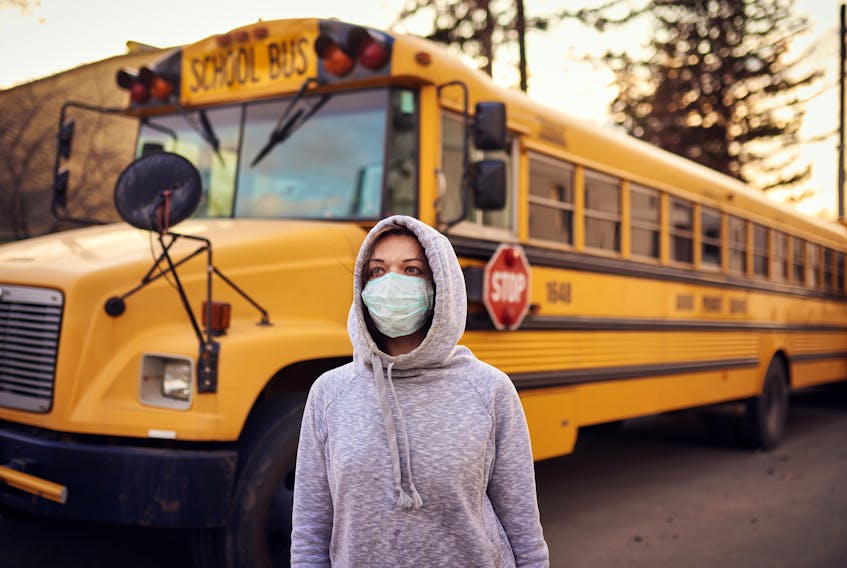When the wheels on the school bus go ‘round and ‘round this September, things are going to look a lot different.
With these changes, and thoughts of COVID-19 dancing in their heads, parents from across Atlantic Canada and wondering just how they will get their children to school this September.
A large number of Annapolis Valley parents indicated they will now be driving their children to school, leaving staff and administrators with concerns about morning drop-off loops, which in many places, were already congested.
Kristen Loyst, Annapolis Valley Regional Centre for Education (AVRCE) communications officer, says parents should not be fearful of putting their children on school buses.
“We are following all advice from Nova Scotia public health, as well as the IWK, as part of the provincial back to school plan. We know that children’s emotional, mental, social and physical development benefits from being in school, and taking the bus is part of the school day for many students,” she says.
Buses will operate as they normally would throughout Nova Scotia, with some new public health protocols in place, says Loyst.
First, in Nova Scotia, everyone must wear a mask on the bus. This includes students in all grades and pre-primary children, bus drivers, educational assistants, as well as parents/guardians who board the bus to help their child get seated, says Loyst. With masks on, students can sit on the bus as they normally would.
“We encourage everyone to bring their own face mask, but there will be a supply of masks available in case anyone needs one,” says Loyst.
The Newfoundland and Labrador English School District’s back to school plan says masks will be required on school buses and siblings will sit next to each other. Assigned seating will also be in place to ensure students sit with the same children each day. Reusable, non-medical masks will be available to all students.
The P.E.I. government’s plan strongly recommends all students and bus drivers wear non-medical masks and family members are encouraged to sit together.

Sensory concerns
It’s the mask protocols on buses that cause concern for parents like Jilllian Crockatt.
Crockatt and her family recently moved to Weston, N.S. She was really looking forward to sending her children on the bus to school. Now, with the new protocols, she plans on driving her three children to two different schools and her youngest to daycare.
“We want to limit the amount of mask wearing for them,” says Crockatt. “We hope our youngest in Grade 1 doesn’t have to wear one at all.”
Melissa Kenney, from Greenwich, N.S. has a different concern when it comes to mask wearing. Her son is autistic and has sensory issues wearing a mask - as does he with the material of clothing, she says.
“I will have no choice but to drop him off and pick him up from school every day,” says Kenney.
Loyst explains that this is not necessarily the case, and parents of students with sensory or health issues who may not be able to tolerate wearing a mask are asked to contact their school to discuss their child’s needs while riding the bus or attending school.
Newfoundland’s document indicates that no student is required to wear a mask on a bus if they cannot tolerate it.
Every situation and each province are different, so there is no blanket response.
Other protection
Besides masks, other protocols will be implemented on buses to keep students safe.
In addition to regular cleaning procedures at the beginning and end of each day, Loyst says in Nova Scotia, enhanced cleaning protocols advised by public health will be implemented. Bus drivers will ensure high-touch surfaces are wiped down and disinfected between bus runs. These cleaning protocols are consistent across Atlantic Canada.
Before riding the bus, everyone is encouraged to wash their hands or use hand sanitizer before going to the bus stop, says Loyst. Parents are asked to screen their children for symptoms before riding the bus and those who are feeling sick must stay home.
Active transportation
Other parents are avoiding the entire bus situation by turning it into an opportunity for active transportation, many choosing to walk or bike to school.
Kourtneay Rodgerson, from Aylesford, N.S., plans that her children will be riding their bikes to school while the weather is still good. Darcy Gaudette says her children could bus if they wanted to, but since they live near the school, they will get some exercise instead.
Rachel Bedingfield, director of parks and recreation in Kentville, N.S. agrees that this is the perfect time to think about active transportation to school. Besides, being outdoors is better for your health, she says.
“Allowing children to walk or bike or skateboard or scooter to school is a way for kids to get some extra time in the great outdoors, reduce stress levels, engage more with their community and develop a sense of independence,” says Bedingfield.
Loyst reminds parents that everyone is adapting to new routines this school year and schools will work together to be flexible for the health of everyone.
“Preventative measures like masks, cleaning, and proper hygiene practices are in place so students can return to their routine of riding the bus with peers,” says Loyst. “As the year progresses, we will continue to follow public health direction to keep students and staff safe.”
PEI Back to school plan: https://www.princeedwardisland.ca/en/information/education-and-lifelong-learning/back-to-school-faqs
Newfoundland Back to School Plan FAQs: https://docs.google.com/document/d/17nP6QoPkDaIvWsm2XtP2u3r6alYhINIqSpas3V5QPXw/edit
Nova Scotia back to school plan: novascotia.ca/backtoschool









